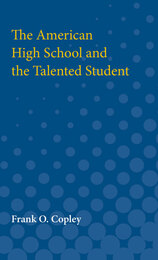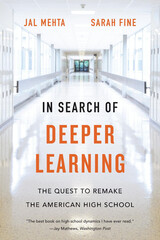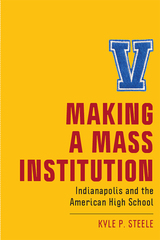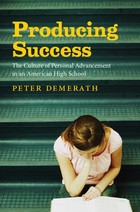

Winner of the Grawemeyer Award
“In their brave search for depth in American high schools, scholars Jal Mehta and Sarah Fine suffered many disappointments…Undeterred, they spent 750 hours observing classes, interviewed more than 300 people, and produced the best book on high school dynamics I have ever read.”
—Jay Mathews, Washington Post
“A hopeful, easy-to-read narrative on what the best teachers do and what deep, engaging learning looks like for students. Grab this text if you’re looking for a celebration of what’s possible in American schools.”
—Edutopia
“This is the first and only book to depict not just the constraints on good teaching, but also how good teachers transcend them. A superb book in every way: timely, lively, and entertaining.”
—Jonathan Zimmerman, University of Pennsylvania
What would it take to transform our high schools into places capable of supporting deep learning for students across a wide range of aptitudes and interests? To find out, Jal Mehta and Sarah Fine spent hundreds of hours observing and talking to teachers and students in and out of the classroom at thirty of the country’s most innovative schools. To their dismay, they discovered that deeper learning is more often the exception than the rule. And yet they found pockets of powerful learning at almost every school, often in extracurriculars but also in a few mold-breaking academic courses. So what must schools do to achieve the integrations that support deep learning: rigor with joy, precision with play, mastery with identity and creativity?
In Search of Deeper Learning takes a deep dive into the state of our schools and lays out an inspiring new vision for American education.


Middle- and upper-middle-class students continue to outpace those from less privileged backgrounds. Most attempts to redress this inequality focus on the issue of access to financial resources, but as Producing Success makes clear, the problem goes beyond mere economics. In this eye-opening study, Peter Demerath examines a typical suburban American high school to explain how some students get ahead.
Demerath undertook four years of research at a Midwestern high school to examine the mercilessly competitive culture that drives students to advance. Producing Success reveals the many ways the community’s ideology of achievement plays out: students hone their work ethics and employ various strategies to succeed, from negotiating with teachers to cheating; parents relentlessly push their children while manipulating school policies to help them get ahead; and administrators aid high performers in myriad ways, even naming over forty students “valedictorians.” Yet, as Demerath shows, this unswerving commitment to individual advancement takes its toll, leading to student stress and fatigue, incivility and vandalism, and the alienation of the less successful. Insightful and candid, Producing Success is an often troubling account of the educationally and morally questionable results of the American culture of success.
READERS
Browse our collection.
PUBLISHERS
See BiblioVault's publisher services.
STUDENT SERVICES
Files for college accessibility offices.
UChicago Accessibility Resources
home | accessibility | search | about | contact us
BiblioVault ® 2001 - 2024
The University of Chicago Press









